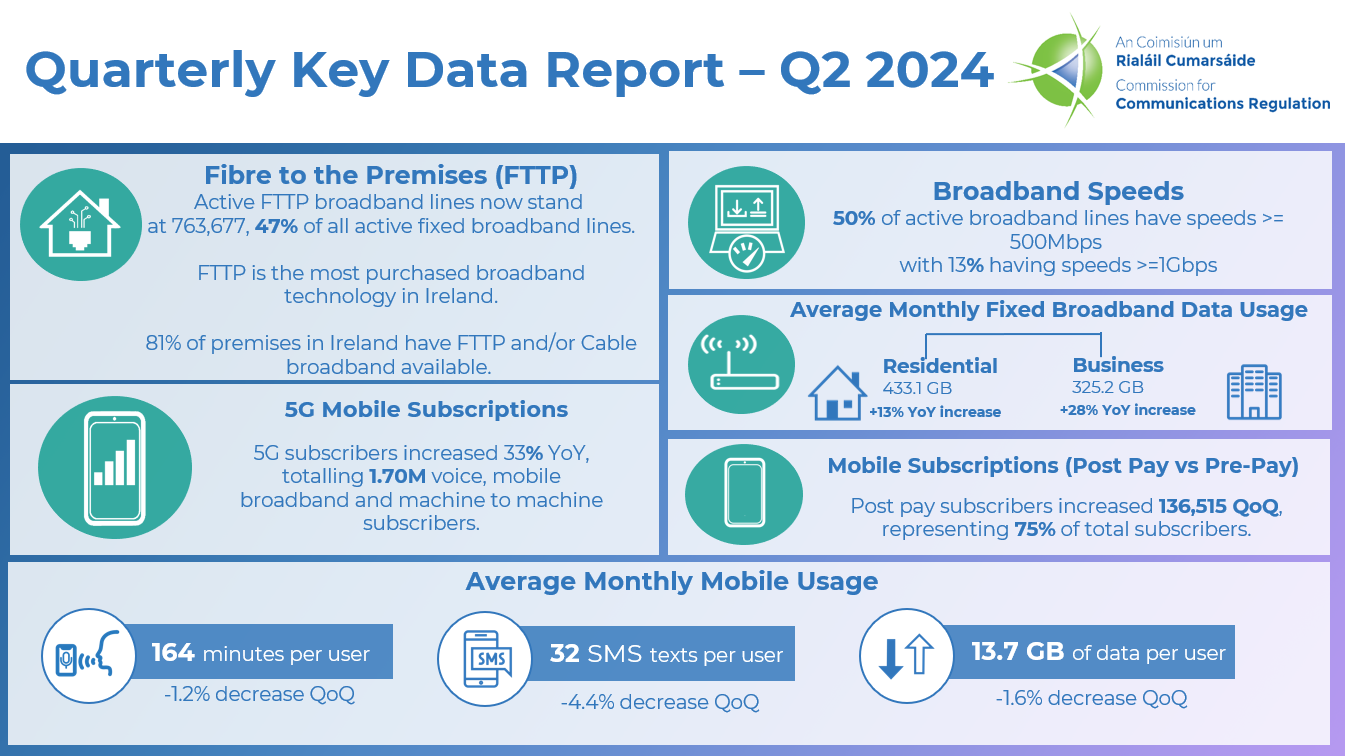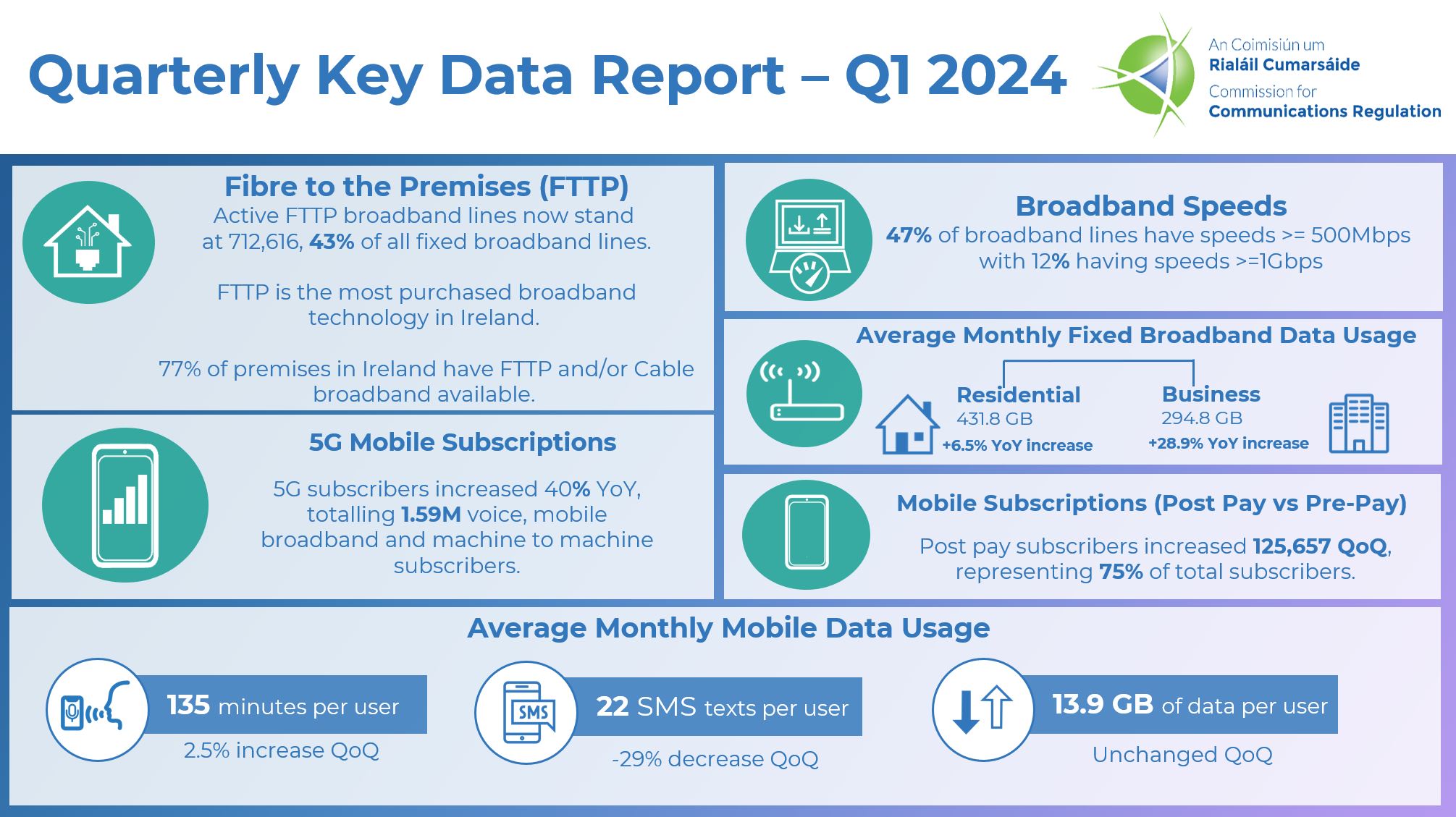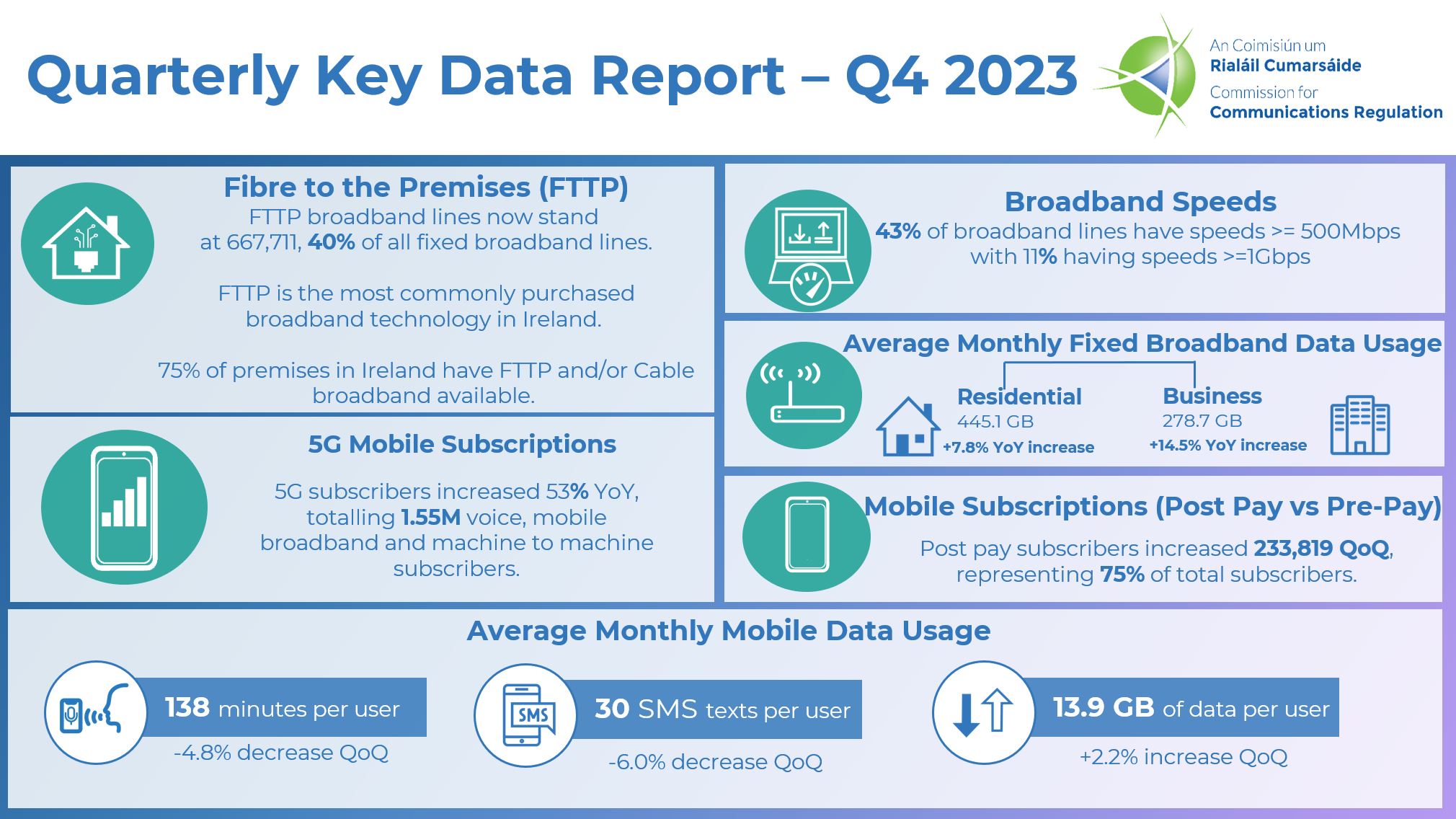Radio spectrum is a scarce and valuable national resource that is managed by ComReg. An important role of ComReg is the assignment of spectrum rights of use for electronic communications services and, in this regard, ComReg has today announced its decision to hold a multi-band spectrum award which will assign long-term rights of use for 20 years across four spectrum bands, all of which are suitable for mobile and wireless broadband (WBB) services.
These spectrum bands are the 700 MHz, 2.1 GHz, 2.3 GHz and 2.6 GHz bands, all of which are harmonised at European level for the provision of WBB services.
In line with European obligations, the spectrum rights will be awarded on a technology and service neutral basis, meaning that new licensees will be free to deploy equipment that complies with the applicable harmonised standards, for mobile, fixed wireless and/or other uses. Without limiting the uses to which the rights of use of spectrum may be put, ComReg expects this award to be particularly suitable for enabling advancements in current 4G services while enabling the delivery of important new 5G services.
The spectrum bands in the award
The award comprises 470 MHz of spectrum rights, which represents a 46% increase in the spectrum assigned for the provision of WBB services in Ireland. This will significantly enable operators to provide improved services to meet ever-increasing consumer demand.
The 700 MHz band is an important band for the provision of widespread coverage, including in rural areas and on national transport routes, and is highly suitable for the provision of existing 4G and, over time, new 5G services. This is especially important in Ireland, given our demography and the costs of deploying very high levels of coverage.
ComReg’s coverage obligations for the 700 MHz band will be required to be achieved over 3 to 7 years and, among other things, will oblige existing licensees to expand their current networks to provide and maintain:
- a 3 Mbit/s service to 99% of the population and 92% of the geographic area of Ireland;
- a 30 Mbit/s service to 95% of the population, 90% of motorways, and 80% of primary roads; and
- a 30 Mbit/s service to 345 specific locations, comprising 40 business and technology parks, 65 hospitals, 24 higher education campuses, 14 air and seaports, 160 train and bus stations, and 42 top visitor attraction information points.
ComReg is also putting in place additional obligations to improve indoor voice and text coverage and quality of service. These obligations will require that licensees deploy and maintain Voice over LTE (VoLTE) and Native Wi-Fi technologies within 2 years.
The 2.1 GHz, 2.3 GHz and 2.6 GHz bands are ideally suited to providing network capacity, if used for mobile, but can also be used for both capacity and coverage purposes, such as for fixed wireless broadband. Of these bands, the 2.1 GHz band is already in use for 3G services and extended to 4G services under the temporary COVID-19 spectrum rights. To ensure the efficient use of spectrum and promote competition ComReg is obliging licensees to deploy a specific number of base stations in each of these bands.
Key aspects of the award
ComReg will award rights to these bands by way of an open, competitive award process where existing operators and potential new entrants can compete for these spectrum rights. Having considered a wide range of potential award options ComReg will use a combinatorial clock auction (CCA). This format has previously been used in Ireland for the successful award of spectrum rights in the 800 MHz, 900 MHz and 1800 MHz Bands in 2012, and spectrum rights in the 3.6 GHz Band in 2017, as well as extensive use internationally, including elsewhere in the EU.
Considering whether certain possible outcomes of the auction could, bearing in mind current spectrum holdings, give rise to concerns about the strength of competition for mobile services in Ireland, ComReg will impose spectrum competition caps in relation to the amount of spectrum, including existing holdings, which a single bidder may hold as a result of the award. Two sets of caps will be used for the duration of this award – a sub-1 GHz cap of 70 MHz and an overall cap of 375 MHz. This approach is consistent with past ComReg awards and also has widespread use elsewhere. This measure will therefore limit the spectrum which operators can acquire in the award, so as to avoid potential distortions of competition.
In relation to the spectrum fees, the minimum price (i.e. auction reserve prices and ongoing spectrum usage fees) for the spectrum rights of use will be set at a conservative level based on a methodology of international benchmarks. This approach encourages competition in the award while also discouraging frivolous bidders. Similar to previous spectrum awards, this means that the final prices will ultimately be determined by the bidders in the auction and not ComReg.
Commenting on this decision, Commissioner Jeremy Godfrey said “This award is central to enabling users throughout Ireland to have access to the next generation of mobile services, including enhanced mobile broadband and innovative new services enabled by 5G. We are setting obligations to ensure that coverage of high-speed services is available to 95% of the population. This award will ensure Ireland plays its part in delivering the European Commission’s 5G for Europe Action Plan, which has also been identified as a key plank for post-COVID economic recovery. The speedy progress of the award will be an important contributor to economic and social development in Ireland for the foreseeable future.”
Find the full and related documents in the Publications Section.
Next steps
Following this decision, ComReg will advance its response to consultation and publication of the Information Memorandum during Quarter 1, 2021 which will commence the award process. The Information Memorandum, when published, will be an implementation of, and will reflect the decision made in this document. Subsequently, ComReg will present the draft licensing regulations for the consent of the Minister for the Environment, Climate and Communications. Following ministerial consent, ComReg will accept applications to the award process.
ENDS
Notes for Editors:
- Spectrum awards, and particularly those suitable for the deployment of mobile and wireless broadband services, are very important events which only occur every few years and which have economy-wide impact. The last major award was in 2017 for the 3.6 GHz band, a 5G candidate band, and before that in 2012 for the 800 MHz, 900 MHz and 1800 MHz bands. Both awards were instrumental in promoting effective competition including new market entry, and the rollout of existing and new services, including 5G, for the benefit of Irish users.
- The licence duration will be 20 years for rights in the 700 MHz, 2.3 GHz and 2.6 GHz bands, with a corresponding shorter duration for rights in the 2.1 GHz band to facilitate a common expiry date for all the bands in the Award.




